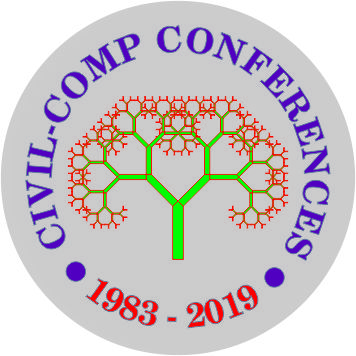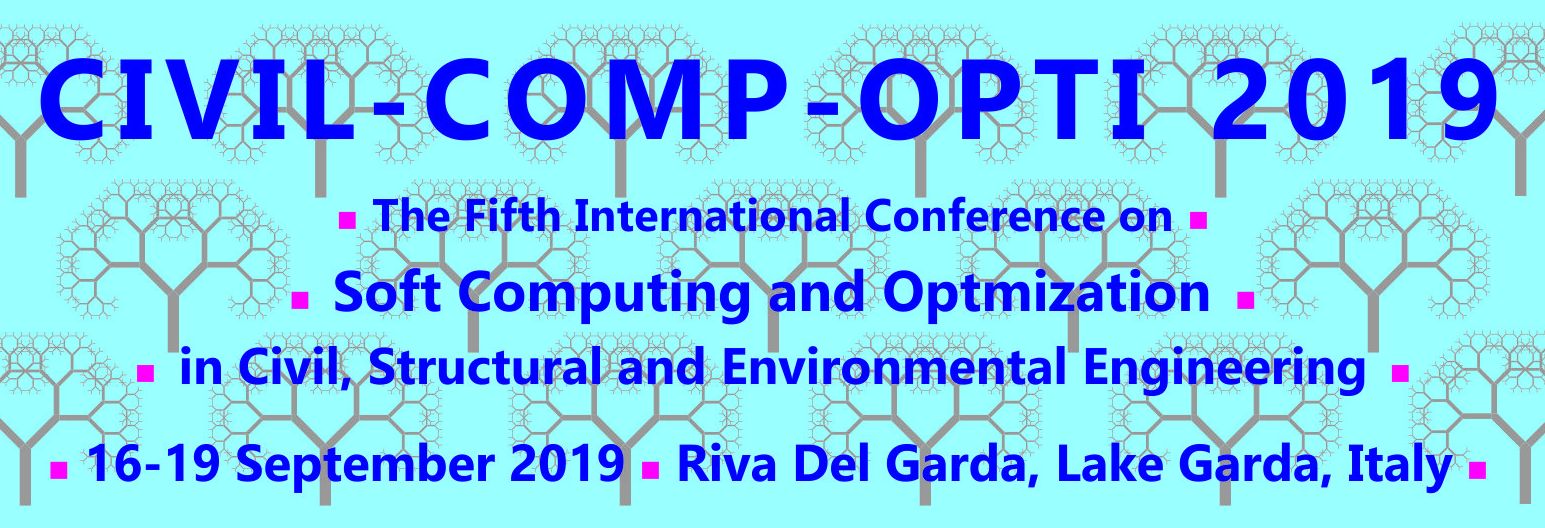Introduction
This is the fifth in this series of conferences concerned with the application of soft computing and optimization to civil, structural and environmental engineering. The first in this series was held in 2009. A major objective
of this conference is to link state-of-the-art research to practice.
This conference runs concurrently with CIVIL-COMP 2019:
The Sixteenth International Conference on
Civil, Structural and Environmental Engineering Computing. Participants may attend
sessions, lectures and presentations from either conference.
Journal Special Issues and Author Seminar
Authors of accepted abstracts who present their papers at the conference may submit their full papers for review for publication in
one of the two conference special issues of the international
"Computers and Structures"
and
"Advances in Engineering Software".
Final papers should comply with the aims and scope of the journals to which they are submitted and make a clear contribution to the state of the art.
An Author Seminar will be held during the conference. Authors who wish to submit to the journal special issues are encouraged to attend the Author Seminar where they will hear some essential tips to aid in the preparation of their journal special issue papers. The speakers at the Author Seminar will be Carrie Christensen (Publisher, Elsevier, New York) and Professor Barry Topping (Editor of the Special Issues).
Conference Venue, Session Times and Conference Dinner
The conference venue will be the Riva Del Garda Congress Centre, Lake Garda, Italy. The conference opening session will be at 5pm
on 16th September. Parallel Sessions will be timetabled on the 17th, 18th and 19th September
from 08.30 to 18.00.
A welcome drinks party will be held after the opening session on the 16th September.
An optional conference dinner will be held on the evening of the 18th September.
Lunches, tea and coffee breaks are included on 17th, 18th and 19th September.
Conference Themes
The two major themes of the conference are:
- Soft Computing and
- Optimization
In many cases there is an overlap between
these two major themes.
The sub-themes corresponding to these themes are listed separately below:
Soft Computing:
Invited Lectures
List currently being prepared - please check back later to see the updated list.
Soft Computing Special Sessions:
- SC 1. "Soft Computing-based Approaches in Structural Engineering and Materials"
Professor H. Naderpour, Iran
- SC 2. "Neural Networks for Engineering Applications"
Dr S. Freitag, Germany
- SC 3. "Soft Computing for Structural Damage Detection"
Dr M. R Vafaei, Iran
- SC 4. "Artificial Intelligence in Structural Health Monitoring System"
Professor Azlan bin Adnan, Malaysia
- SC 5. "Advances in Structural Optimization and Seismic Safety"
Professor Saeed Gholizadeh, Iran
Additional Soft Computing Themes:
Techniques and Tools:
The Soft Computing Techniques and Tools include (but are not restricted to):
- Biologically Inspired Soft Computing
- Neural computing
- Support Vector Machines
- Artificial neural networks
- Data-driven computing
- Fuzzy systems
- Genetic and Evolutionary algorithms
- Ant colony optimization
- Evolutionary methods
- Artificial Growth
- Simulated annealing
- Harmony search
- Graph Theory based techniques
- Cellular automata
- Swarm intelligence
- Bayesian networks
- Chaos theory
- Data mining
- Expert systems
- Support vector machines
- Hybrid optimization algorithms
- Predator-prey
- Response surfaces
- Polynomial chaos
- Artificial immune systems and immune computing
- Robust design
- Inverse methodologies
- Self-organizing maps
- Multi agent systems
- Evolutionary polynomial regression
- Machine learning
- Deep Learning
- High Performance Computing
- Fuzzy logic
- Differential evolution
- Metaheuristic and Swarm Intelligence
- Ant colony optimization
- Particle swarm optimization
Areas of Application:
Papers describing the application of the above techniques to all
branches of civil, structural and environmental engineering may be presented
at the conference. The areas of application include, but are not limited to:
- advances in soft computing technology
- artificial simulation applications
- new trends in numerical methods and solution strategies
- Multi-Objective and Many-Objective Optimization
- parallel and grid computing technologies
- structural mechanics and design
- mesh and grid generation
- water engineering and hydraulics
- structural computational mechanics
- inverse structural engineering
- multi-scale simulation and failure mechanics
- stochastic mechanics, robustness and reliability
- structural and multidisciplinary optimization
- life-cycle cost analysis and performance-based design
- structural dynamics and control
- coupled and interaction problems
- wave propagation and soil dynamics
- structural earthquake and geotechnical engineering
- computational geosciences, geostatistics and geoenvironmental engineering
- damage analysis and vulnerability assessment
- health monitoring and maintenance systems
- repair and retrofit of structures and infrastructures
- smart structures and materials
- Mechanics
- Mechanical Engineering
- biomechanical mechanisms and structures
- risk analysis and decision making
- project management and operations research engineering
Optimization:
Invited Lectures
List currently being prepared - please check back later to see the updated list.
Optimization Special Sessions:
- OPT 1. “Robust Structural Optimization”
Professor Anikó Csébfalvi, Hungary
- OPT 2. “Multi-Constrained Optimal Design of Structures and Microstructured Materials”
Professor Matteo Bruggi, Italy
- OPT 3. "Structural Optimization for Bridge Design"
Professor L.M. Simoes and Professor Alberto Martins, Portugal
- OPT 4. "Computational Methods for Structural Optimization in Seismic Design"
Professor R. Greco, Italy
- OPT 5. "Topology Optimization for Additive Manufacturing"
Professor Weihong Zhang, Professor Jihong Zhu, ProfessorTong Gao and Professor Liang Meng, China
- OPT 6. "Advances in Reliability-Based Structural Optimization"
Dr Ghias Kharmanda and Professor Abdelkhalak El-Hami, France
- OPT 7. "Optimization of Structures under Polymorphic Uncertainty"
Dr S. Freitag, Germany, Professor W. Graf, Germany, Professor G. Meschke, Germany and Professor R.L. Muhanna, USA
- OPT 8. "Metaheuristic Optimization Algorithms and Strategies"
Dr Noëlie Di Cesare, France
- OPT 9. "Optimization Approaches in Earthquake Engineering"
Professor Dimos Charmpis, Cyprus
- OPT 10. "Structural Optimization with Manufacturing Constraints"
Professor Andrzej Myslinski, Poland
Additional Optimization Themes:
Techniques and Tools:
The list of Optimization Algorithims, Tools and Techniques considered during this conference
includes (but is not restricted to):
- Gradient and Non-Gradient Methods
- Numerical Techniques
- Re-Analysis Techniques for Static and Dynamic Problems
- Swift Analysis
- Sensitivity Analysis
- Evolutionary and Genetic Optimization
- Convergence Guarantees
- Necessary and Sufficient Conditions
- Randomized Search Methods
- Heuristic Procedures and Methods
- Bionic Growth Method
- Algorithm Development
- Multi-Objective Optimization
- Integration of Optimization with Design Tools
- Surrogate Modelling or Meta-Models
- Inverse Problems
- New or Novel Optimization Algorthims for Engineering Problems
- Use of High Performance Computing for Large Scale Problems
- Reliability Optimization
- Algorithms for Stochastic Optimization
- Robust Algorithms
- Integration of Optimization and Computational Steering
- Integration of Optimization with Design Tools
- Parallel
and Distributed Evolutionary Algorithms
- Game Strategies
Areas of Application:
Presentations describing the application of the above Tools and Techniques to all
branches of civil, structural and environmental engineering may be presented
at the conference. The areas of application include, but are not limited to:
- Civil Engineering
- Construction Engineering
- Project Control and Management
- Structural Engineering
- Design Optimization
- Structural Optimization
- Multidisciplinary Optimization
- Topology Optimization
- Optimization for Manufacturing Processes
- Non-Linear Material Behaviour in Optimization Processes
- Shape Optimization
- Architectural Engineering
- Structural Mechanics
- Composite Structures
- Computational Mechanics
- Smart Structures
- Multi-Physics Problems
- Multi-Scale Problems
- Materials Design
- Micro and Nano Materials
- Smart Materials
- Composite Multifunctional Materials
- Masonry Structures
- Adaptive Structures
- Optimal Control for example in Seismic Design
- Design for Uncertainty
- Industrial Problems
- Bio-mechanical Structures
- Mechanics
- Mechanical Engineering

